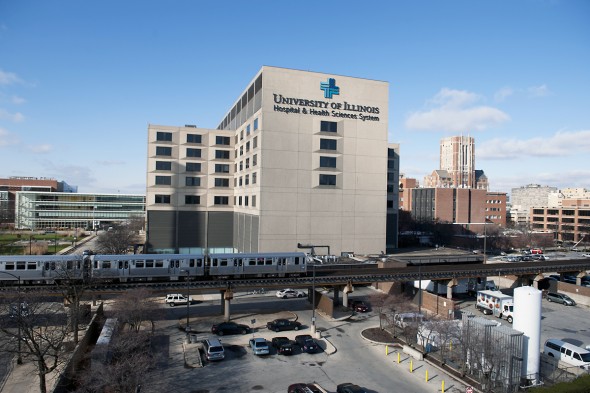University trustees approve health care reorganization

Trustees approved a plan for UI Health that includes a vice chancellor who reports to the chancellor. Photo: Roberta Dupuis-Devlin/UIC Photo Services
The framework of a reorganization plan for UIC’s hospital, clinics and seven health science colleges — aligning them all under one campus leadership structure — was approved by the university Board of Trustees Nov. 14 at its meeting in Springfield.
Under the new structure, the university-level vice president for health affairs position will be eliminated and replaced by a campus-based vice chancellor for health affairs.
The vice chancellor, who will report to the chancellor, would oversee all clinical and health sciences academic programs.
Currently, the hospital and clinics operate independently from campus academic units. Patient care operations are administered by a university-level vice president for health affairs and college deans report to the UIC provost.
University President Bob Easter is charged with developing new job descriptions and reporting lines to present to trustees at their March 6, 2014, meeting.
Easter said the reorganization would create a unified health care enterprise that integrates faculty research and expertise into clinical care.
“This reorganization reaffirms our commitment to advance health care education and fostering innovation that will better serve the needs of our citizens,” he said. “It creates a framework to establish high goals for achievement that would position the health enterprise at UIC to be a leader among its peers.”
Avijit Ghosh, senior adviser to the university president, said the new alignment would improve the efficiency of the entire health services operation.
“By having the proper structure in place, we can be a more nimble organization in our decision-making,” he said. “We can really leverage the strengths that we’ve built.”
Ghosh said the reorganization would improve collaboration through a comprehensive strategy that makes priorities easier to set, the establishment of a unified budget, and increased accountability with “a single point of responsibility and authority.”
“To date, these opportunities have not been fully explored,” he said.
Brian Kay, vice chairman of the UIC Senate and head of biological sciences, said senators welcome the plan. He said the senate had been consulted during the drafting process and had offered recommendations.
“We recognize that UIC needs to develop a model that is flexible and nimble,” he said.
The hospital and clinics receive more than 400,000 patients visits a year. The university’s hospital, clinics and health-related academic units comprise more than 60 percent of UIC’s $2 billion budget.
